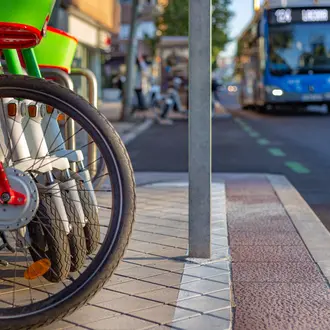About 85% of plastic ends up in landfills, oceans, and incinerators, resulting in 6% of global carbon emissions. Recycling fails due to poor infrastructure, high costs, and limited incentives—making it cheaper to use fossil-fuel derived plastic. Stwart Peña Feliz, MBA ’23, co-founded a company to tackle this problem—a startup he created by tapping into skills he built at MIT Sloan in Entrepreneurship Lab (E-Lab).
Peña Feliz’s startup, MacroCycle Technologies, turns plastic and polyester waste into virgin-grade PET (a type of plastic) using a process that consumes 80% less energy than traditional methods—providing a pathway where plastics are not only diverted from landfills and the ocean, but can also be turned back into plastics without the emissions when powered with renewable energy.
Two years after launching his company, Peña Feliz was eager to share what he’s learned with current MIT Sloan students. And Product Management Lab (PM-Lab) students Alain Hyacinthe, MBA ’26; Mallika Khanna, MBA ’26; Jules Nguyen, MBA ’26; and Ethan Takeyama, MBA ’26; were eager to help MacroCycle take its next big step: entering new markets in the world of textiles.
The PM-Lab team first removed verticals from their research that would be too difficult for MacroCycle to enter. Then they homed in on slow-fashion apparel, interviewing contacts from several high-profile brands.
From these interviews, I gained insight into the supply chain process for small, slow-fashion apparel brands and discovered the potential steps MacroCycle would need to take to begin entering these markets.
Based on the students’ work, MacroCycle was given the recommendation to target slow fashion textiles as its beachhead market for deployment of a recycled textile product.
“The main benefit of hosting the project was having a group of passionate and experienced students address one of the biggest questions I did not have the time or the resources to pursue myself,” says Peña Feliz. “Their final recommendations reaffirmed some of my hypotheses, while shedding completely new light on others. They will most definitely shape the future MacroCycle takes in our commercialization strategy.”
Turning an idea into action
Peña Feliz was born in the Dominican Republic and moved to New York at the age of 11. Before coming to MIT, he worked at one of the first chemical recyclers in the oil and gas industry. There he witnessed the not-so-positive impact of those technologies. Plastics were being eliminated from landfills and oceans, but they were being turned into oil for other applications with additional emissions. In an August 2022 MIT Sloan Action Learning profile about Peña Feliz’s own experience taking E-Lab, he stated that he hoped to start his own business in the energy/sustainability sector after graduation. Did he know back then that he would co-found Macrocycle?
“No I did not!” he says, emphatically. “The crazy thing about that article is that I basically manifested my dream to come true. When I came to MIT Sloan, my goal from the beginning was to become an entrepreneur. When I took E-Lab, it was for the sole purpose of developing those skills to make sure I was ready when the opportunity presented itself.”
Just a month after that article came out, Peña Feliz’s opportunity took shape. In a Climate and Energy Ventures class, he met his now co-founder, Jan-Georg Rosenboom, who was an MIT postdoctoral scientist at the time. The two began to realize the potential of their new venture. Nine months after meeting, they incorporated MacroCycle.
Paying it forward
Even today, Peña Feliz says he still relies on the lessons he learned in E-Lab. For instance, commercialization strategy, he notes, is equally as important as the technological development.
“Developing a sound go-to-market strategy focuses where resources should be allocated in the technological development pathway and eases the deployment process which is equally as critical as the technology itself. It can prevent you from ending up on a path that could kill your company before you even have a chance to reach the market.”
Coming full circle, Peña Feliz is honored to host the MIT Sloan Action Learning students following in his footsteps. He’s also hiring interns through the MIT Sloan Sustainability Initiative Internship Program.
It’s so interesting and fun being on the other side of the table. I’m excited to mentor the next generation of Sloanies and help them achieve their own dreams because the only reason I made it to where I am today is because of the support of others who have walked my path. I’m happy to pass on that help to the future leaders and entrepreneurs excited to create their own name in this world!



